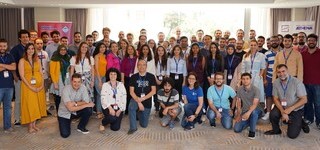Organizers
ACM
ACM brings together computing educators, researchers, and professionals to inspire dialogue, share resources, and address the field’s challenges. As the world’s largest computing society, ACM strengthens the profession’s collective voice through strong leadership, promotion of the highest standards, and recognition of technical excellence. ACM supports the professional growth of its members by providing opportunities for life‐long learning, career development, and professional networking.
Founded at the dawn of the computer age, ACM’s reach extends to every part of the globe, with more than half of its 100,000 members residing outside the U.S. Its growing membership has led to Councils in Europe, India, and China, fostering networking opportunities that strengthen ties within and across countries and technical communities. Their actions enhance ACM’s ability to raise awareness of computing’s important technical, educational, and social issues around the world.
ACM Europe Council
The ACM Europe Council aims to increase the level and visibility of ACM activities across Europe. The Council is comprised of European computer scientists committed to fostering the visibility and relevance of ACM in Europe, and is focused on a wide range of European ACM activities, from high-quality ACM conferences in Europe, to expanding ACM chapters, to encouraging greater participation of Europeans in all dimensions of ACM.
Athena Research Center
The "Athena" Research and Innovation Centre in Information, Communication and Knowledge Technologies (ARC) is one of the leading research centers in Europe. It serves the full spectrum of the research lifecycle, starting from basic and applied research, continuing on to system & product building and infrastructure service provision, and ending with technology transfer and entrepreneurship. The fundamental role of ARC is to build knowledge and devise solutions and technologies for the digital society. Its value lies in the unique collection of skills and know-how of its researchers and professional staff and its national and international reputation. ARC comprises three institutes and five units. The institutes cover vibrant areas of digital technology and the units incubate know-how development activities that may lead to new major development directions. The institutes are: Institute for Language and Speech Processing (ILSP), the Industrial Systems Institute (ISI), and the Information Management Systems Institute (IMSI). The units are: Corallia - Hellenic technology cluster initiative, Space programmes (SPU), Robot perception and interaction (RPI), Environmental and networking technologies and applications (ENTA), and Pharma - Informatics.
Participate

Speakers

Daily Schedule

Keynotes & Courses

Committee

Venue
